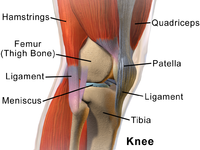
Photo from wikipedia
Osteoarthritis (OA) is a degenerative disease affecting the majority of over 65-year-old people and characterized by cartilage degeneration, subchondral abnormal changes and inflammation. Despite the enormous socioeconomic burden caused by… Click to show full abstract
Osteoarthritis (OA) is a degenerative disease affecting the majority of over 65-year-old people and characterized by cartilage degeneration, subchondral abnormal changes and inflammation. Despite the enormous socioeconomic burden caused by OA, currently, there is no effective therapy against it. Upper Zone of Growth Plate and Cartilage Matrix Associated (UCMA) is a vitamin K-dependent protein and has a critical role in pathophysiological conditions associated with bone and cartilage. However, yet there is no research about the protective role of intra-articular UCMA treatment in OA pathogenesis. Therefore, we aimed to investigate the potential therapeutic role of UCMA in an in vivo model of OA. We report for the first time that intra-articular UCMA injection ameliorated cartilage degeneration in monosodium iodoacetate-induced OA rat model. Besides, the OA-induced activation of nuclear factor kappa B and bone morphogenetic protein 2 signals was attenuated by UCMA. Our results indicated that UCMA decreased cartilage oligomeric matrix protein levels but did not affect Interleukin 6, total antioxidant status, and total oxidant status levels in the serum. In conclusion, UCMA exhibited a therapeutic potential in the treatment of OA. This protective effect of UCMA is possibly achieved by reducing the aggrecanase activity and the production of inflammatory cytokines.
Journal Title: Canadian journal of physiology and pharmacology
Year Published: 2020
Link to full text (if available)
Share on Social Media: Sign Up to like & get
recommendations!